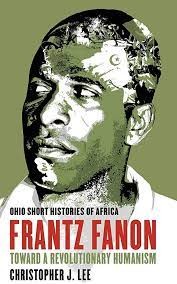Frantz Fanon
Ohio University Press has a series of "Short Histories of Africa". I recently decided to pick up most of the collection for potential use as reading materials for classes. This post covers "Frantz Fanon: Toward a Revolutionary Humanism" (2015) by Christopher J. Lee. Unlike other books in this series, this book delves into quite a lot of detail in analyzing the writing (three full chapters). This might have been intentional, as an attempt to find a niche for a biography that has seen an increase of interest and scholarship of recent. As a support for students reading those works, this would be a useful companion for contextualization. A couple of (brief) notes:
"Violence remains the most controversial issue regarding Fanon— an intrinsic, yet polarizing, dimension of his work that has strengthened his critics and been an inconvenient topic for his admirers. It arguably explains the greater popularity of Black Skin, White Masks over The Wretched of the Earth – the latter outlining his argument for violent struggle." (p. 31)
"Violence was therefore not random, but the product of certain conditions. Or, as the critic Barbara Harlow has written, it is only random when history is disregarded. Violence continues to be an important issue to debate vis-à-vis Fanon. Indeed, it must be debated, given the strong moral reasons and considerable successes of peaceful forms of political struggle and self-determination. But, in doing so, it is important to grasp the nuanced, even pragmatic, ways in which he understood it. Confronted with a decision between continued colonial dehumanization or actively resisting it, violence as an action taken remained a necessary cost for Fanon, if true and complete liberation, in all its dimensions, was to be achieved." (p. 174)

